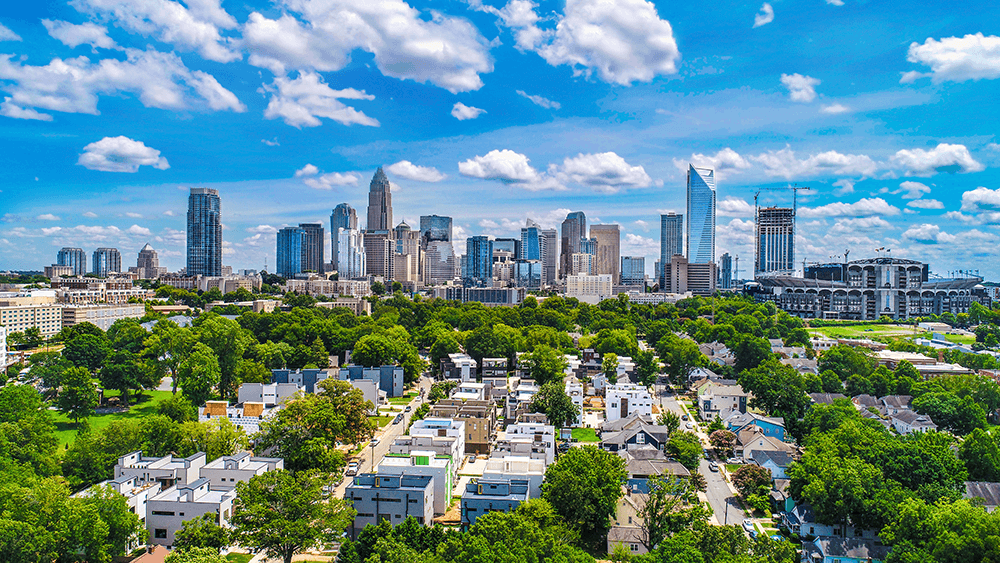
 Local Guide
Local GuideMost Affordable Places to Live in North Carolina
North Carolina is a state with a low cost of living, a strong and diverse economy, and a naturally beautiful state. With weather that tends to be mild most of the year and both the ocean and the Appalachian Mountains to explore, it is easily a destination for those who want to enjoy nature all year long. Yet, North Carolina has much more to offer, including a strong business climate, numerous retirement communities, and a favorable tax environment.
If you are considering moving to North Carolina, these are the most affordable cities in NC to take a closer look at living in.
#1 Eden
- Population: 15,325
- Average home price: $161,500
- Average rent price: $1,242 per month
- Crime rate: 28.07 per 1,000 residents
- Unemployment rate: 5.40%
Located just to the south of the confluence between the Dan and Smith Rivers, Eden is a charming, slightly rural area with much to offer including being a short 35 mile drive to Greensboro. The city has several distinct neighborhoods, including the City Center area with service-oriented businesses and the residential areas of Fairview and Meadow Summit. The city has several textile factories, including some that were opened in the late 1800s. Its economy is also based on the brewing industry as it is the home of Miller Brewing Company. With an affordable cost of living overall, Eden is an attractive option for those who are looking for a strong and growing economy thanks to the strong research and healthcare industry here. Whether you wish to spend time at the Bridge Street Center, Peter Hill Park, or Freedom Park, there are lots of outdoor amenities to enjoy here as well.
#2 Laurinburg
- Population 14,908
- Average home price: $170,500
- Average rent price: $824
- Crime rate: 53.83 per 1,000 residents
- Unemployment rate: 5.60%
Located in the southern portion of the state, Laurinburg is a quaint community located about 90 miles from Charlotte. It’s only a short drive to the Pinehurst Resort Championship Golf Course and about 2 hours to the beach. Yet, being located right off US Highway 74 provides this city with much more to offer those who call it home.
The city is noted for its location near Fayetteville and Fort Bragg, and has often been a valuable location for those who live and work there. It is home to numerous historical sites, including the John Blue House, the Villa Nova, and St. Andrews University. It’s easy to find something to do here, whether that’s enjoying the Scotland County Highland Games in the summer or exploring the right natural beauty of the Lumber River State Park.
#3 Rocky Mount
- Population: 54,013
- Average home price: $200,576
- Average rent price: $900 per month
- Crime rate: 33.66 per 1,000 residents
- Unemployment rate: 4.80%
Rocky Mount is a moderately sized community just off I-95 and just to the north of Greenville. It’s close to the mountains and the ocean, with numerous parks to allow residents to enjoy the fantastic year-round temperatures. This city is home to the Historic Rocky Mount Mills Village, an area that is home to older homes that date to the 1800s, which is registered on the National Register of Historic Places.
Rocky Mount’s economy is mostly based on agriculture and the manufacturing of textiles and pharmaceuticals, but there is also a strong presence of research here, thanks to its location near the Research Triangle. It is also home to Pfizer. When exploring the city, you may stop in at the Rocky Mount Mills for a craft brew or take in a day at the Imperial Centre for the Arts and Sciences, where there’s an art and children’s museum.
#4 Fayetteville
- Population: 208,873
- Average home price: $213,987
- Average rent price: $1,233 per month
- Crime rate: 38.90 per 1,000 residents
- Unemployment rate: 4.40%
Known as the home of Fort Liberty, a U.S. Army installation, Fayetteville is a bit city, one that has a thriving economy, good schools, and a diverse way of life. Yet, even as large and modern as it is, this is a community that remains rather affordable to live in. It’s economy is based, not just on the military but also on its service industry with numerous restaurant, shops, healthcare facilities, and entertainment businesses present.
Yet, there’s much to do and explore here, too including locations of historic importance like Cool Springs Tavern and Heritage Square. It’s also home to Cape Fear Botanical Garden, the Women’s Club of Fayetteville, and the Crown Coliseum, a local theater. A walk along Hay Street to meet friends or a long job on the Cape Fear River Trail creates a high quality of life here.
#5 Greenville
- Population: 89,233
- Average home price: $259,245
- Average rent price: $1,326 per month
- Crime rate: 29.09 per 1,000 residents
- Unemployment rate: 3.90%
Greenville is the county seat of Pitt County and the 12th largest city by population in the state. It is a city that is known for its shops and restaurants, especially in the downtown historic area. Yet, Greenville also holds true to its name, with numerous parks and expansive greenspaces to explore. There are numerous historic sites here, including the College View Historic District, the Skinnerville-Greenville Heights Historic District, and the Greenville Tobacco Warehouse Historic District. For those looking for things to do, the arts and cultural aspects of Greenville make it a local treasure, including the East Carolina University campus with its children’s programming and concerts. It is also home to the Greenville Civic Ballet.
The cost of living in Greenville is highly competitive for the area, often offering moderately sized homes with tree-lined streets as well as some areas of more urban-centric design. The largest economic industries here include healthcare, education, and research.
North Carolina has a higher cost of living than some areas of the country, but there are still many affordable places to call home here. Exploring them all allows individuals to really get a feel for the natural beauty, economic strength, and overall quality of life this state has to offer.
Education and Schools in North Carolina
North Carolina boasts a robust education system, offering a wide array of schooling options tailored to meet the diverse needs of students. From top-rated public schools to renowned colleges and universities, the state prioritizes academic excellence. North Carolina is home to prestigious institutions such as Duke University, the University of North Carolina at Chapel Hill, and North Carolina State University, providing world-class education across various disciplines. Moreover, the state's commitment to education extends beyond traditional classrooms, with initiatives promoting STEM education, vocational training, and extracurricular activities. Families relocating to North Carolina can rest assured that their children have access to quality education and ample intellectual growth and development opportunities.
Outdoor Recreation in North Carolina
With its breathtaking natural landscapes and diverse terrain, North Carolina offers abundant outdoor recreational activities for enthusiasts of all ages. From the majestic peaks of the Appalachian Mountains to the pristine shores of the Outer Banks, the state provides endless hiking, camping, fishing, and water sports opportunities. Numerous state parks, national forests, and wildlife preserves dot the landscape, providing sanctuary for indigenous flora and fauna while offering visitors a chance to reconnect with nature. Whether exploring scenic trails along the Blue Ridge Parkway, kayaking down tranquil rivers, or lounging on sandy beaches, North Carolina's outdoor wonders never fail to inspire awe and adventure.
Healthcare Options and Facilities in North Carolina
North Carolina's healthcare system is renowned for its accessibility, quality, and innovation, ensuring residents can access comprehensive medical services and cutting-edge treatments. The state is home to world-class hospitals, research institutions, and healthcare facilities staffed by skilled professionals dedicated to improving patient outcomes and enhancing public health. From routine check-ups to specialized care, North Carolina offers a wide range of healthcare options to meet the needs of individuals and families alike. Moreover, the state prioritizes preventive care and health education initiatives, empowering residents to lead healthier, more fulfilling lives.
Cultural Diversity and Community Life in North Carolina
North Carolina celebrates its rich cultural heritage and diverse community life, fostering a sense of inclusivity, belonging, and mutual respect among its residents. The state's diverse communities offer a tapestry of traditions, languages, and cuisines, from vibrant festivals and cultural events to historical landmarks and heritage sites. Moreover, North Carolina's cities and towns are renowned for their welcoming neighborhoods, strong sense of community and spirit of volunteerism. Whether attending a local farmers' market, exploring multicultural neighborhoods, or participating in community service projects, residents of North Carolina find ample opportunities to connect, engage, and build lasting relationships.



